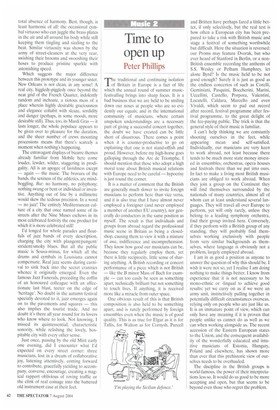Time to open up
Peter Phillips
rrhe traditional and continuing isolation 1. of Britain in Europe is a fact of life which the annual round of summer musicfestivalling brings into sharp focus. It is a bad business that we are held to be smiling down our noses at people who are so evidently our equals; and in the international community of musicians, where certain unspoken understandings are a necessary part of giving a successful concert together, the doubt we have created can be little short of disastrous. There comes a point when it is counter-productive to go on explaining that one is not stand-offish and proud. However, before my high-horse goes galloping through the Arc de Triomphe, I should mention that those who adopt a high moral tone about British musical relations with Europe need to be careful — hypocrisy is just round the corner.
It is a matter of comment that the British are generally much slower to invite foreign musicians to perform here than vice versa, and it is also true that I have almost never employed a foreigner (and never employed a member of another EU country), nor generally do conductors in the same position as myself. The result is that individuals and groups from abroad regard the professional music scene in Britain as being a closedshop, causing them to view it with a mixture of awe, indifference and incomprehension. They know how good our musicians can be, because they regularly employ them, yet there is little reciprocity, little sense of sharing anything. A British recording or concert performance of a piece which is not British — like the B minor Mass of Bach for example — can too easily be seen as something apart, technically brilliant but not something to touch lives. If anything, it is received more like a miracle from outer space.
One obvious result of this is that British composition is also held to be something apart, and is rarely performed by foreign ensembles even when the music is of good quality. This is as true for Elgar as it is for Tallis, for Walton as for Cornysh. Purcell and Britten have perhaps fared a little better, if only selectively, but the real test is how often a European city has been prepared to take a risk with British music and stage a festival of something worthwhile but difficult. Here the situation is reversed: our Proms may feature Dvorak, but who ever heard of Stanford in Berlin, or a nonBritish ensemble recording the anthems of S.S. Wesley or Pelham Humphrey, let alone Byrd? Is the music held to be not good enough? Surely it is just as good as the endless concertos of such as Corelli, Geminiani, Pasquini, Boccherini, Marini, Uccellini, Castello, Porpora, Valentini, Locatelli, Caldara, Marcello and even Vivaldi, which seem to pad out record after record, festival programme after festival programme, to the great delight of the fee-paying public. The trick is that the general style of their music is familiar.
I can't help thinking we are constantly shooting ourselves in the feet, while appearing mean and self-satisfied. Individually, our musicians are very keen to work abroad, not least because there tends to be much more state money invested in ensembles, orchestras, opera houses and festivals there than we put into ours. In fact to make a living most British musicians are obliged to work abroad. When they join a group on the Continent they will find themselves surrounded by the nationals of many countries, almost all of whom can at least understand several languages. They will travel all over Europe to perform, yet will only rarely, unless they belong to a leading symphony orchestra, find their group invited here. Conversely, if they perform with a British group of any standing, they will probably find themselves working exclusively with people from very similar backgrounds as themselves, where language is obviously not a problem, largely employed abroad.
I am in as good a position as anyone to answer the question of why this should be. I wish it were not so, yet I realise I am doing nothing to make things better. I know from experience that it is not necessary to be mono-ethnic or -lingual to achieve good results; yet we carry on as if we were an army unit, instinctively pulling together in potentially difficult circumstances overseas, relying only on people who are just like us. It is an immature point of view, which can only have any meaning if it is proven that people unlike us cannot do as well as we can when working alongside us. The recent accession of the Eastern European states to the Union, and the consequent availability of the wonderfully educated and intuitive musicians of Estonia, Hungary, Poland and elsewhere, has shown more than ever that this prehistoric view of ourselves needs to be overhauled.
The discipline in the British groups is world-famous, the power of their interpretations less so. It would do us good to be more accepting and open, but that seems to be beyond even those who regret the problem.


























































 Previous page
Previous page